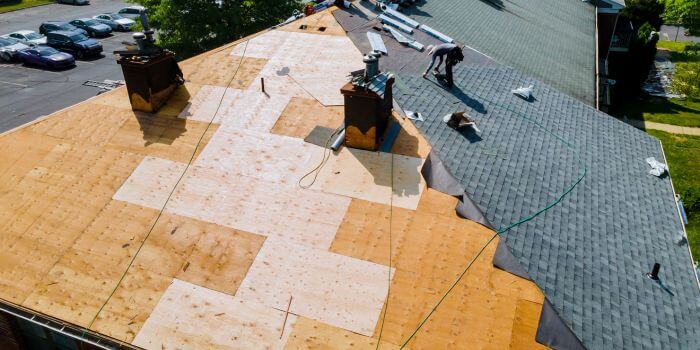Table of Contents
Roofing Project
Nothing beats getting ready like staying ready. Roofing projects are no exception to the rule. Top-Rated Roofers in Indianapolis know this.
That’s why whether you’re installing a new roof, replacing the current one, or doing repairs, staying educated and prepared are the keys to completing a smooth and successful roofing project. It helps to know what the experts say.
Like everywhere else, roofing projects in Indianapolis are considerable investments for homeowners.
The benefits are huge when done correctly since roofs provide a great deal of protection to everything that falls under them. Let’s look at some specific details about how to properly prepare for a roofing project.
Examining the Demands of the Job
Each roof has specific needs that require careful and accurate assessment. While it’s all basic roofing work, the nuances of those needs can make or break a roofing project.
Get to know those needs by scheduling to have a contractor come and give you an initial consultation. Get multiple assessments to formulate an accurate estimate of the job’s cost.

An assessment will help you learn if you require a total roof replacement, need repairs for current problems, or simply require some add-ons.
The present condition of your roof, type of roofing material, damage assessment, and age are all important factors.
This evaluation marks the beginning of your roofing project and guides you into the next phase of your project.
Selecting the Right Contractor
Now it’s time to choose a contractor to lead your project. This means you should research the roofing companies in Indianapolis.
Go online to read customer reviews, and to have the contractor’s credentials verified. Note which contractors have experience on jobs like the one you need for your roof. Once multiple quotes have been obtained, you can make an informed decision.
Measuring the Size of the Job
The scale of your roofing project needs to be accurately estimated before any work begins. How many jobs are within the total project?
How many man-hours will be needed to complete the work? How much space will be needed to get things done?
Questions like these and others must be answered within a certain margin of error. Discuss these details with your contractor.
The Project Budget
The project budget must be set with the smallest margin of error possible. Also, you must understand that it’s better to come in under budget rather than over, so don’t be afraid to overestimate the initial cost.
The cost of materials, man-hours, paperwork, expected delays, potential overtime, and insurance must all be covered in the budget.
There are a few guidelines you can follow to prevent you from blowing your budget. You must resist the temptation to choose the lowest bid, as doing so could mean the contractor uses substandard materials.
Avoid being underinsured at all costs. Accidents happen, but they shouldn’t stop your project. Also, make contingency plans for emergencies just in case.
Get the Right Permits
Before starting your roofing project, contact local authorities in Indianapolis to make sure your plans are up to code and officially green-lit.
Specific regulations regarding materials, installation methods, and aesthetic considerations may vary from one district to another.
Be sure your project complies with city rules to avoid potential lawsuits or work stoppages.

Be a Good Neighbor
Roofing can be noisy and disruptive. This is why it’s important to inform your neighbors about your project.
Tell them about your timeline, possible noise disruptions, and whatever else may disturb them.
Clear communication helps prevent conflicts before they start. When your neighbors feel considered, they’re less likely to make any official complaints.
Prepare Your Home’s Exterior
Roofing projects create sizable amounts of waste. Old shingles, nails, and other materials piling up are part of the process.
The exterior of your home should be prepared accordingly. All items of value need to be removed from the work area.
A clear workspace protects your belongings and ensures the safety of the roofing crew.
Check the Weather Forecast
Weather conditions can affect roofing projects. If the weather doesn’t cooperate, the project could be delayed.
You must know the weather forecast for the scheduled project date, and plan accordingly. This means avoiding planning to work when the seasons produce adverse conditions.
Contractors usually know the times of year that are most disruptive, so ask their advice concerning these matters.
Family Matters
Roofing projects can be disruptive, so let your family know what’s happening. Daily routines could otherwise be disturbed if everyone isn’t informed of what’s happening.
Everyone in your household should know the project timeline, potential noise levels, and any temporary inconveniences.
If you own pets, be aware of how to keep them safe as the project unfolds. You might need to move to a different location during parts of the project, so keep that in mind.
Inspections and Permits
Permits may be required for your roofing project. This all depends on the scope of the work you plan to have done.
If permits are needed, the municipal authorities governing your home will need to grant them.
For this to be done they must come on-site and make sure that you’re within regulations. Failure to comply can result in fines or work stoppages.

Waste Removal Plans
Because of the amount of debris generated during these jobs, plans to remove it must be laid out carefully.
You and your roofing contractor will have to pick a waste removal contractor to work with.
Plans for an on-site dumpster, pickups, and other relevant details will have to be arranged. Waste removal ensures a clean and organized work site throughout the project.
Contracts
The project can begin once the proper contracts are completed. As such, you’ll want to review the contract carefully, even double-checking to be sure you haven’t missed anything.
A well-drafted and comprehensive contract is essential for a successful roofing project.
The Bottom Line
By following these expert tips, you will safeguard your project from hitting snags and stoppages. Preparation is the key that will make your roofing project succeed from start to finish.
Keep in mind that your roofing project in Indianapolis requires careful consideration, planning, and communication.
The budget must be tight, the contractor must be experienced and reputable, the site and building plans must operate within the guidelines of municipal codes, and the weather must be agreeable. Only then will your roofing project be ready to go.
Also, Read
Top 8 Reasons Why You Should Invest in Rain Gutters
5 Styling Secrets to Make Your Home Look Amazing
How to Design and Build Your Own House?
Types of Windows Used for Houses and Buildings